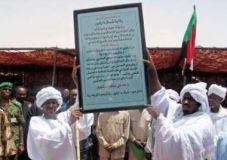Some Darfur tribes agree local settlement
By Opheera McDoom
UMM KADDADA, Sudan, May 5 (Reuters) – Sudan’s first vice president witnessed the signing of a peaceful settlement of tribal conflict in Darfur on Thursday in a remote part of the region after weeks of talks.

|
|
Two tribal leaders from Darfur hold a framed agreement they just signed, aimed at a peaceful settlement of tribal conflict in the troubled region, in Umm Kaddada, Sudan, May 5, 2005. (Reuters). |
Thousands of cheering villagers, brightly dressed women and white-turbanned camel riders greeted Ali Osman Mohamed Taha in Um Kaddada in the northeast of troubled Darfur.
Some in the crowd said their solution to the tribal clashes in the east of the region should be used as a template for the rest of Darfur.
The agreement came after 2 weeks of talks between local tribes, Arabs and non-Arabs, and involved drawing boundaries between farms and nomadic cattle herders’ grazing paths.
“We say here again that the only solution to the problem in Darfur is through peace and negotiations,” Taha told thousands of Darfuris.
“We say to those who are carrying arms amongst us now and to the world: our hands are outstretched to you, our hearts are open to you. We don’t want war anymore,” he said.
The rebellion in Darfur by non-Arab tribes is now in its third year. Tens of thousands have been killed in violence and more than two million fled their homes in the remote west.
The rebellion hardly affected the northeast but the web of tribal tensions did touch some villages.
Amid Abdallah from an Arab tribe said rebels attacked a few villages in the region and tried to force people to join their military campaign and turn the non-Arabs against the Arabs.
“But instead we united all the tribes and discussed and solved the problem ourselves,” he said.
Those from non-Arab tribes were difficult to find among the crowd but Ahmed Ibrahim who was there said he thought tribal talks were the best way forward.
The tribal talks began in Khartoum between Arab tribes led by Musa Hilal, who the United States says is a top Arab militia leader suspected of war crimes during the rebellion.
They came to an agreement with some of the non-Arab Fur tribal leaders, one of the main tribes involved in the rebellion. They then moved the talks to the grass roots in Darfur. The agreement in Um Kaddada is the result of such talks.
Taha, the interior minister, the minister of humanitarian affairs and the U.S. charge d’affaires were among the dignitaries who travelled to Um Kaddada to witness the signing.
The town has a new hospital, which the governor said was part of the development needed to stop the fighting in Darfur.
Taha signed a peace deal in January to end more than two decades of civil war in the south. The president then asked him to turn his attention to Darfur.
But some local sheikhs in other areas of Darfur have cast doubt over whether armed groups will listen to tribal leaders.
